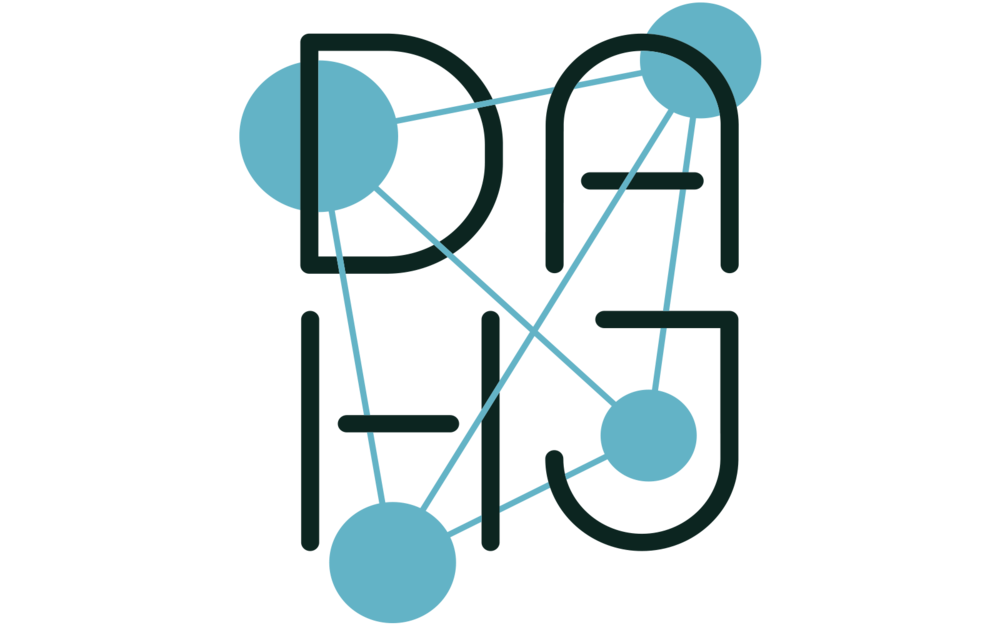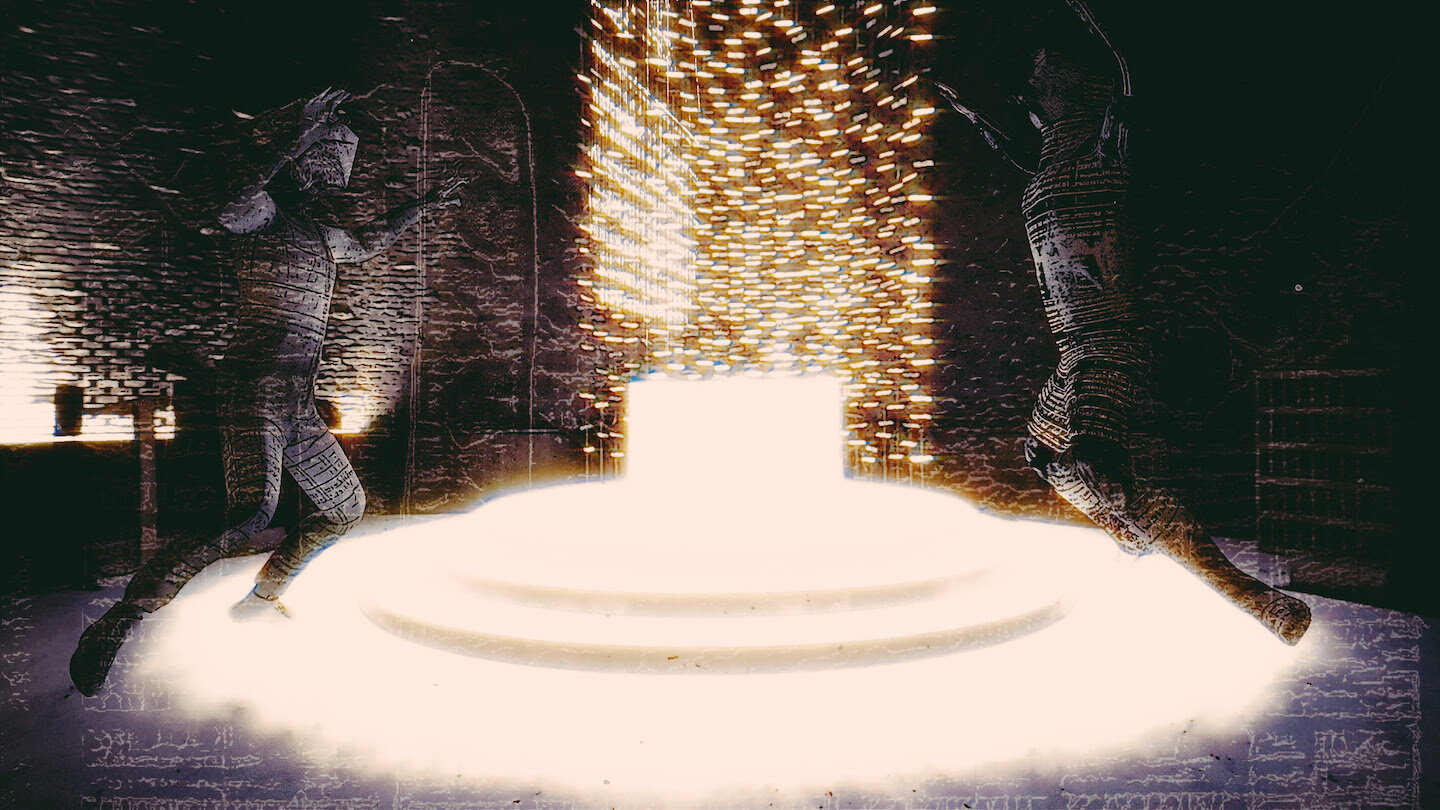Matthew Ritchie's The Invisible College: Color Confinement Film Premieres April 6
A multi-part transmedia artwork exploring the many dimensions of the Massachusetts Institute of Technology
Film screening and online exhibition Tuesday, April 6 - ongoing
Q&A event with artist Matthew Ritchie, William Lockett, Shara Nova, Sarah Schwettmann, Sarah Wolozin, and Evan Ziporyn April 9 at 11am ET.
The premiere of Matthew Ritchie’s new work The Invisible College: Color Confinement and artist Q&A breakout session are presented as part of the MIT Center for Art, Science & Technology’s symposium “Unfolding Intelligence: The Art and Science of Contemporary Computation.”
As the 2018–21 Dasha Zhukova Distinguished Visiting Artist at MIT, Matthew Ritchie has created a multi-part transmedia artwork, The Invisible College. The central theme, as is often the case in Ritchie's work, is the emergence of hidden narratives from the specific informational qualities of the site. At MIT, The Invisible College was inspired by new developments in artificial intelligence, collaborations with a multidisciplinary team of MIT faculty and students, and Sir Francis Bacon's 1626 unfinished utopian science fiction story, New Atlantis, which proposed the first description of the scientific method, ultimately becoming the model for research institutions like MIT. What has emerged from that confluence of ideas is a recursive reflection on experimental inquiry, embodied in a science fiction detective story, set in an evocative, almost mythological version of MIT. In Color Confinement, masked avatars embody the elementary 'color-charged' particles called quarks and anti-quarks. As these mysterious figures roam the almost deserted MIT campus, their activities might be read both as a meditation on the role of the masked persona in gaming and popular culture, and as a response to the masked world that defined 2020 during the COVID-19 pandemic.
The film is available for viewing now on YouTube and the MIT website.
The first part of The Invisible College project was manifested in early 2020 as a site-specific performative VR piece titled House of Strangers, using Generative Adversarial Networks (StyleGAN and CycleGAN) and artificial intelligence (GPT-2) to generate imagery and content. When the campus was closed during the COVID-19 pandemic, the VR game necessarily migrated across media to become a second work, Latent Island, which nested footage from the GANs and the VR game inside 360° footage of the now empty campus. The third iteration of the project, Color Confinement, is now premiering as part of the “Unfolding Intelligence” symposium.
This even deeper recursion was also made without setting foot on the closed campus, using 'actors' derived from a video game engine. A richly-textured mood piece, Color Confinement is a melancholy study of genre play, world building, and the physics of sight, as the avatars representing the elementary colored particles called 'Red', 'Green,' and 'Blue', move in and out of other informational narratives within the film. The haunting score by Evan Ziporyn and Shara Nova is a further collaboration within this recursive structure.
The final iteration, House of Illusion, will feature the avatars reenacting scenes from the film in a large-scale public augmented reality work; completing the cycle from site information, to site-specific game, then to informational film, and finally back to the original physical site.
The MIT Center for Art, Science & Technology presents The Infinite College: Color Confinement as part of its symposium “Unfolding Intelligence: The Art and Science of Contemporary Computation” (April 1-9, 2021). The symposium gathers artists, scientists, and humanists to discuss aesthetic, technical, and critical issues pertaining to artificial intelligence (AI) and computation. The goal of this interdisciplinary conversation is to bridge popular and tech-world understandings of AI as well as domain-specific, academic, and artistic approaches. “Unfolding Intelligence: The Art and Science of Contemporary Computation” is third in a series of MIT CAST symposia that bring together artists, scientists, engineers, and humanists from a variety of disciplines to address topics of common concern in areas of rapidly evolving research and urgent social relevance.
Register for the MIT symposium to attend the Q&A as well as other parts of the "Unfolding Intelligence" symposium April 1-9, including an online exhibition of 14 generative artworks entitled Generative Unfoldings, commissioned by MIT CAST, as well as four panels: Bias in AI, Deep Time & Intelligence, Open Systems, Unfolding Models, and breakout sessions with the speakers.
Matthew Ritchie is a contemporary artist based in New York who works in installation, performance, painting, drawing, sculpture, and sound. Ritchie’s work addresses questions about the nature of the universe and our understanding of it, and asks what these enigmas might look like when manifested through artistic creation.
The Invisible College: Color Confinement was written and directed by Matthew Ritchie, with animation by Nick Roth and original music by Evan Ziporyn and Shara Nova. The MIT Center for Art, Science & Technology (CAST) provided production support. StyleGAN implementation by Sarah Schwettmann and Matthew Ritchie, and CycleGAN implementation by Chi-Hua Jonny Yu. Markus Buehler, Peter Fisher, Peter Galison, Caroline A. Jones, and Sarah Wolozin served as advisors on the project.
The MIT Center for Art, Science & Technology (CAST) creates new opportunities for art, science, and technology to thrive as interrelated, mutually informing modes of exploration, knowledge, and discovery. CAST’s multidisciplinary platform presents performing and visual arts programs, supports research projects for artists working with science and engineering labs, and sponsors symposia, classes, workshops, design studios, lectures, and publications. More information: arts.mit.edu/cast
Questions? Contact MIT CAST: cast@mit.edu
Images: Matthew Ritchie's Invisible College, Courtesy Matthew Ritchie Studio and MIT



